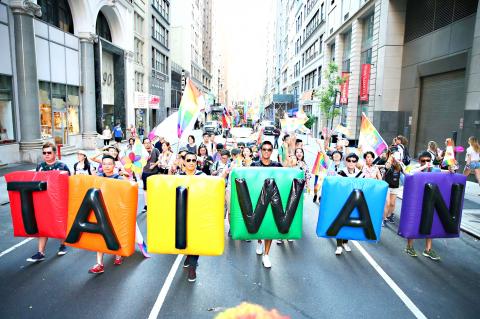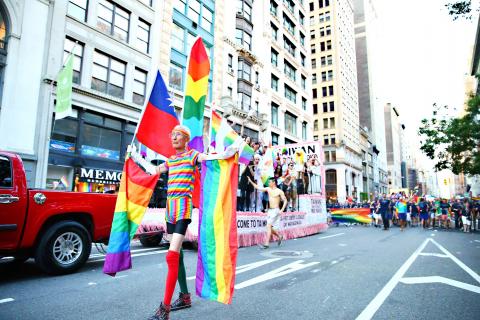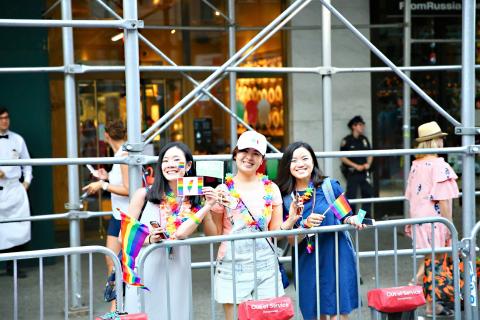This past Sunday wasn’t the first time that Chi Chia-wei (祁家威) attended the New York City Pride March. He participated in 1994, 1997 and again in 1999 during a different period in the struggle for gay rights.
But for many Taiwanese Americans and overseas Taiwanese, including members of New York’s LGBTQ community, this year’s parade in Manhattan held added significance, with Taiwan’s Constitutional Court ruling in May in favor of same-sex marriage.
Chi, a 59-year-old gay-rights activist at the forefront of that battle, said it felt great to come to New York City and be part of the annual event, which made him an honoree this year.

Photo courtesy of Liu Shun-ping
“Taiwan is... a very small country,” he said in Mandarin during an interview ahead of the parade. “But everyone is so concerned with and paying attention to the development of gay rights in Taiwan, so I think it’s wonderful.”
Chi was among the more than 40,000 marchers expected to traverse the 3.4-kilometer route under sunny skies in Manhattan. Also in attendance were Taiwanese Americans who raised nearly US$13,000 through a crowdfunding platform called GoFundMe to pay expenses for their own float and to bring over Chi from Taiwan.
HERITAGE OF PRIDE

Photo courtesy of Liu Shun-ping
As an honoree, Chi was invited to ride the Heritage of Pride float at the head of the parade as onlookers waved rainbow flags. He later joined the Taiwan float farther back, led by a line of marchers holding up block letters in the colors of the rainbow flag that spelled “Taiwan.”
Participants also used the occasion to promote Taiwan’s own pride parade in late October, the largest in Asia.
Sunday’s crowd size wasn’t immediately known, though last year’s march attracted 2.3 million people, according to organizers.

Photo courtesy of Liu Shun-ping
Those who came out to show their support cheered as the Taiwan group made its way down the parade route. Liu Wen (劉文), one of the participants, estimated around 200 people joined Taiwan’s float.
“I saw a lot of not only queer folks but also straight Taiwanese friends who came this year, so it was a really exciting and touching moment for me to see everyone together,” Liu said.
But even on the heels of Taiwan’s marriage-equality ruling, Liu said she felt a sense of conflict about the celebratory atmosphere, having lived in the US for a number of years.
“I think we do have the right to [celebrate] because we fought for this for a very long time,” Liu said. “But the more American part of me also worries [if it is] the right moment to do it in the US, especially in New York, when there’s a lot of violence happening around people of color.”
New York’s annual pride parade, in its 48th year, traces its roots to the Stonewall Riots of June 1969. That was when patrons of the Stonewall Inn, a popular gay bar in Manhattan’s Greenwich Village, fought back against police who were conducting a raid.
That unrest and the ensuing demonstrations are credited with launching the modern struggle for lesbian, gay, bisexual and transgender civil rights in America.
POLITICS AND PROTEST
Politics at times tinged the tenor of Sunday’s parade, with some marchers directing harsh words toward US President Donald Trump, a target of ire for some in the LGBTQ community. Unlike former President Barack Obama, a Democrat, Trump had not yet issued a proclamation this year for pride month, celebrated in June.
There were also protests. At one point at least one group of marchers sat down and blocked the parade route until police moved in. They were part of what appeared to be an anti-police demonstration. Those participants were eventually placed in handcuffs and ushered away.
Taiwanese marchers had much to be proud of and happy about this year. Among them was Hsu Bor-cheng (許伯丞), a Taiwanese-American community organizer who spearheaded the float fundraiser.
He said he learned about New York City’s pride parade in the early 2000s through his lesbian friends who marched in it. Hsu helped them make banners and T-shirts, he said, and later thought about ways of bulking up turnout among Taiwanese Americans.
Before this weekend, Taiwanese had floats in the parade in 2010 and again in 2016, according to Hsu. This year’s, adorned with rainbow flags featuring the outline of the nation in the center, was a big upgrade thanks to successful fundraising efforts, Hsu said.
He added there were other dimensions to their participation as well.
“We know that Taiwan is excluded by the international community and organizations,” Hsu said. “But that does not prevent Taiwan from advancing herself in terms of human rights, and especially the rights of LGBTs.”
On the minds of many marchers was the court ruling in late May that turned the tide on marriage equality in Taiwan.
Nearly two years after the US Supreme Court legalized same-sex marriage, Taiwan’s grand justices found that provisions of the nation’s constitution violated guarantees of freedom of marriage and the right to equality. As a result, the judges gave the legislature two years to amend the relevant laws.
If they are not changed within that time, same-sex couples will be permitted to register their unions at household registration offices, Judicial Yuan Secretary-General Lu Tai-lang (呂太郎) has said.
Chi was one of the petitioners in that court case, fighting tenaciously for more than 30 years for marriage equality in Taiwan. For the younger generation, like 30-year-old Chuang Cheng-huai, who didn’t give the Chinese characters for his name because his parents don’t know that he is gay, Chi is a trailblazer for all of Taiwan.
“If he wasn’t the first person to do this, it probably still wouldn’t happen today,” said Chuang, a fashion designer who owns a boutique in Manhattan.
Chi acknowledged his importance as an inspirational figure for younger Taiwanese.
“I was originally afraid that these people, when they were young, would look at me as if I was some ogre,” he said. “But they said when they were young they knew they were gay, so they didn’t see me like that. They appreciated and admired me.”
Liu said activists in Taiwan are also thinking about matters beyond marriage equality, including transgender rights and youth sex education, even as pockets of opposition to same-sex marriage still exist.
“I do think that the Stonewall spirit is in part of the Taiwanese activists’ mind,” she said.
“Hopefully in two years if things works out right...we can work on more diverse issues,” Liu added.

As Taiwan’s second most populous city, Taichung looms large in the electoral map. Taiwanese political commentators describe it — along with neighboring Changhua County — as Taiwan’s “swing states” (搖擺州), which is a curious direct borrowing from American election terminology. In the early post-Martial Law era, Taichung was referred to as a “desert of democracy” because while the Democratic Progressive Party (DPP) was winning elections in the north and south, Taichung remained staunchly loyal to the Chinese Nationalist Party (KMT). That changed over time, but in both Changhua and Taichung, the DPP still suffers from a “one-term curse,” with the

William Liu (劉家君) moved to Kaohsiung from Nantou to live with his boyfriend Reg Hong (洪嘉佑). “In Nantou, people do not support gay rights at all and never even talk about it. Living here made me optimistic and made me realize how much I can express myself,” Liu tells the Taipei Times. Hong and his friend Cony Hsieh (謝昀希) are both active in several LGBT groups and organizations in Kaohsiung. They were among the people behind the city’s 16th Pride event in November last year, which gathered over 35,000 people. Along with others, they clearly see Kaohsiung as the nexus of LGBT rights.

Jan. 26 to Feb. 1 Nearly 90 years after it was last recorded, the Basay language was taught in a classroom for the first time in September last year. Over the following three months, students learned its sounds along with the customs and folktales of the Ketagalan people, who once spoke it across northern Taiwan. Although each Ketagalan settlement had its own language, Basay functioned as a common trade language. By the late 19th century, it had largely fallen out of daily use as speakers shifted to Hoklo (commonly known as Taiwanese), surviving only in fragments remembered by the elderly. In

Dissident artist Ai Weiwei’s (艾未未) famous return to the People’s Republic of China (PRC) has been overshadowed by the astonishing news of the latest arrests of senior military figures for “corruption,” but it is an interesting piece of news in its own right, though more for what Ai does not understand than for what he does. Ai simply lacks the reflective understanding that the loneliness and isolation he imagines are “European” are simply the joys of life as an expat. That goes both ways: “I love Taiwan!” say many still wet-behind-the-ears expats here, not realizing what they love is being an